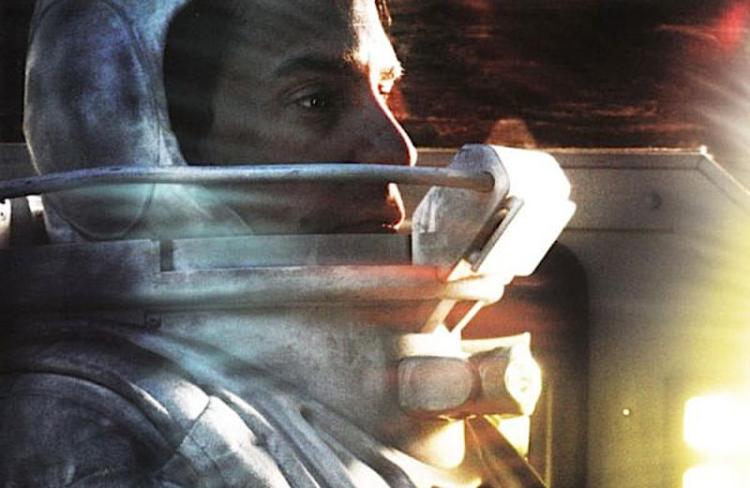*WARNING: THIS PIECE CONTAINS STRONG SPOILERS TO DUNCAN JONES” “MOON” *
With “Star Trek”, “Avatar”, and “District 9” coming out within a year, there’s no question about it; 2009 was a great year for scifi. However, the one I admire most is also the most underrated, Duncan Jones’ “Moon”. Here’s a film that appears to be simple, yet the more I think about and discuss it both online and offline, the deeper and more complex it becomes. On the surface there’s the simple story of a man working alone on the far side of the moon. He interacts with pods similar to what we’ve seen in “Silent Running” – which the director often cites as an inspiration. “2001: A Space Odyssey” is obviously another inspiration for Gerty talks a lot like Hal 9000. However, “Moon” isn’t another scifi ripoff, it’s a film packed with homage references yet maintains originality delivering a fresh meal for hungry scifi geeks. While “2001: A Space Odyssey” relies on the cold performances of the main characters, “Moon” relies on the emotional states of the central character. Hal 9000 is a villain, whereas Gerty is a hero. All of this has a startling effect on a first time viewer as we expect one thing and end up with another.
In any case, I thought it would be interesting to explore the many ideas and themes “Moon” touches upon. When we go to the movies, we bring our memories, experiences, and beliefs with us. One way or another they contribute to our understanding and occasionally preference of a film. Therefore, when you watch a film, the film remains the same for both you and the guy sitting next to you, but the experience can be very different. I say that because more often than not, people tend to overanalyze films to an extent that it no longer becomes the vision of the director but that of the viewer. What we end up discussing is what we want the film to be about rather than what it actually is about. While conversations and debates about the meaning of a certain film are fun and often intellectual in nature, at the end of the day, it isn’t fair and no matter what you come up with, it can never be definitive.
“I would not think of quarreling with your interpretation nor offering any other, as I have found it always the best policy to allow the film to speak for itself.” _ Stanley Kubrick
The following interpretation is one that I do not support nor approve; nevertheless I find it quite intriguing and will therefore share it with you. While discussing the film online, an anonymous fan explained how “Moon” is against organized religion. His theory is farfetched, yet fascinates me. The way he saw it, Sam’s term on the moon stands for our time on Earth. The implanted memories and recorded videos with his wife signify religion being imposed and forced on us. He further explained how in the film Sam has to be behave accordingly and if he does his job well then after his time on the moon (our time on Earth), he is promised to travel to an after-life of joy and happiness (Earth for him, heaven for us). Sam serves Lunar Industries, an unseen corporation in the distant sky symbolizing God. He sends out messages and assumes they are being listened to (as in daily prayers), when in fact, they were probably never delivered at all. He backed up his interpretation with further support mentioned how at the end of the Sam(s) time on the “Moon”, they lie down in a box which is similar in shape to a coffin and instead of being sent to the promised land, their body is cremated to ashes. Therefore the clones represent generations of humans who are told the same lie in order to preserve order.
I have to admit, his theory did grab my attention. Then I realized that as Kubrick complained, the fellow wasn’t letting the film speak for itself. Nope, he did most of the talking. Besides, Sam does end up reaching the “promised land” or Earth, so how can it be against religion if the ending is proof that the “promised land” exists and can be reached. Were the mining pods named after the four apostles (Mathew, Mark, Luke and John) to bear religious significance? According to one of the special features on the DVD or bluray, the answer is no. In the Sundance Film Festival Q & A featurette, someone asked the writer if the naming of the pods has any religious subtext, he replied saying that nothing was implied by the naming.
So theories, subliminal messages, and personal interpretations aside, what was “Moon” really about? The posters of the film have two taglines plastered on them. One reads “The last place you’d ever expect to find yourself.” The other read “250,000 miles from home, the hardest thing to face…is yourself” I think it’s fair to say that “Moon” is about facing yourself. After watching the film a few times and reading those lines I was reminded of something the fictional character Red said in “The Shawshank Redemption”. In a key scene Red wishfully expresses: “I look back on the way I was then: a young, stupid kid who committed that terrible crime. I want to talk to him. I want to try and talk some sense to him, tell him the way things are. But I can’t.” In “Moon” Sam can and he does. After a series of accidental events occur, Sam faces another clone. To avoid confusion I’ll try to number the Sam(s). Doing so requires breaking up how many Sam Bell exist or existed. By allowing the film “to speak for itself” we can figure this out.
I’ll refer to the original Sam who is back home with his daughter as Sam 0. We know that when Sam left for the moon, his wife was still pregnant with his child. When the Sam we are first introduced to finally contacts her, we see that she’s actually fifteen years old. Therefore, fifteen divided by the life span of a single clone (3 years) is five. This means that the dying Sam is actually the fifth one to be awakened. The other “new” Sam we see in the film is Sam 6, and later in the film they bring Sam 7 into the picture.
Anyway, Sam 5 ends up facing Sam 6. They both realize that they’re clones and the plot starts to unfold. Jones doesn’t treat the “twist” (he’s a clone) as a twist but rather as a plot device to move the story forward. For the remainder of the runtime, Sam 5 and 6 try to confirm the reality of their being by searching for evidence to support the fact that they are in fact clones. Through their interaction we realize how different Sam 5 is from Sam 6. Sam 5 is calm, wise, and mature while Sam 6 has an anger problem and often bursts into violent behavior. Thanks to well thought-out writing and a power-horse performance by Rockwell, the genius of the situation is as follows. Sam 5 spent three years alone, during that long term he dealt with loneliness and this helped him become a better person. In one of the recorded videos, his wife tells him that three years is a long time but it’s good for their relationship and important for him to change.
Sam 5 describes himself as a “peaceful warrior” before Sam 6 starts a fight- a very cleverly filmed scene. After the fight, Sam 5 realizes what his wife meant. “He’s got a problem. He scares me, Gerty…he flies off the handle. I see it now. I see what Tess was talking about.”,he tells Gerty. Sam Rockwell’s performance is more than just two performances put together using technical effects, Rockwell displays a before-and-after arc of Sam’s personality change. Credit has to be given to the excellent writing and direction too.
So while both Sam 5 and Sam 6 search for evidence, they interact with each other, and through their interaction they learn more and more about who they truly are. It’s not all ugly, there’s one particular moving scene when both Sam(s) sit in a rover remembering how “they” first met Eve. Midway through the conversation Sam 6 looks at Sam 5 and sees him dozing off and the scene switches from touching to heartbreaking instantly. By then both characters are two different individuals yet remain the same. It’s like watching the same person interacting with one another but each is trapped in a different time zone. The question of what would it be like to actually meet yourself is definitely one theme. Another obvious theme is big industry exploitation on innocent people. Jones also keeps mentioning in interviews that long distance relationships and how we cope with the isolation is one of the aspects he tried to express as he went through that face in the writing process. Besides the universal concept of inner loneliness, the film plays with some interesting ethical and philosophical questions.
Jones was a philosophy major before dropping out and going to film school. The questions he asks in his stunning masterpiece of a debut are both thought-provoking and interesting conversation starters. What if you woke up and found out that everything you know and remember was implanted and memories were never your own? What if you discover you’re a newborn with only three years to go when in fact you it feels you’ve been around a lifetime? Would time feel short or does the implanted memories make it seem like you’ve been around a lifetime? How can Sam see the girl in the yellow dress (his daughter) before even actually seeing her? Would clones have some kind of a mental connection deeper than that shared by twins? After all, they share(d) the same thoughts and experiences. Is the original Sam oblivious to the Lunar Industries cloning scheme? How painful is it to discover that you’re just a clone and have absolutely no purpose in life whatsoever? “Moon” is the type of film you watch over and over again only to discover details you missed the first/second/third time around (Sam 6 looking at an empty space suit hanger before heading out and finding out who’s wearing it./ The wiped out smiley faces./ The list goes on) So while the film is rich with philosophical ideas grandeur in scope, it presents them in a tightly focused and efficiently structured psychological thriller. My conclusion is that “Moon” like most think pieces is a cult classic that presents us with many questions about humanity, philosophy, religion and ethics. The second we fill out the answer sheet with interpretations we breach the one way flow of information.
The Official Trailer:
My favorite track on Clint Mansell’s haunting score:




Great film, one my favorites. Really liked your review here. We should listen and look more often before drawing hard and fast conclusions.
LikeLike
Thanks, Ted. I agree, we should examine a film carefully before jumping into conclusions. “Moon” is a film that requires multiple viewings for full appreciation. It’s hard scifi brilliance
LikeLike